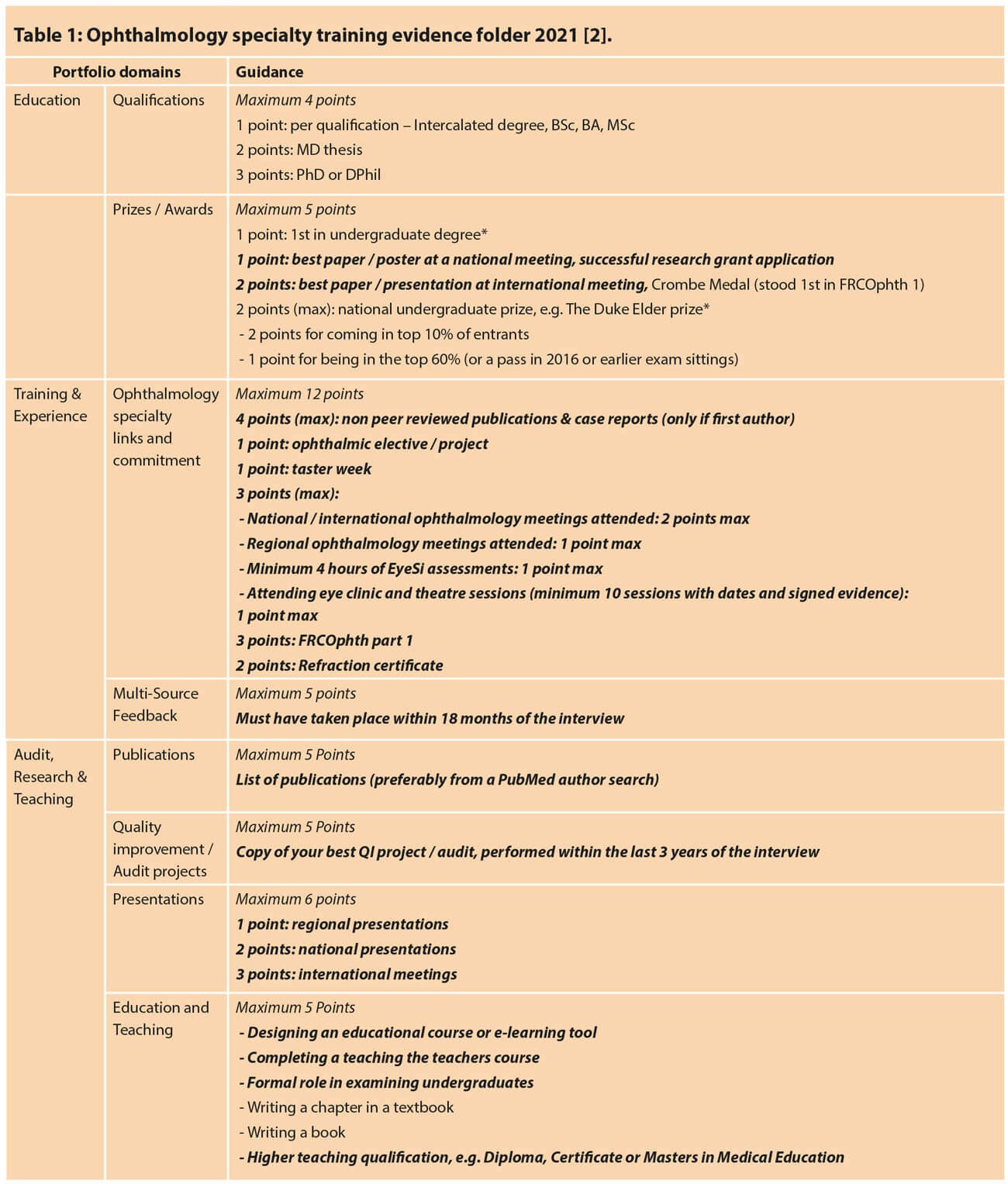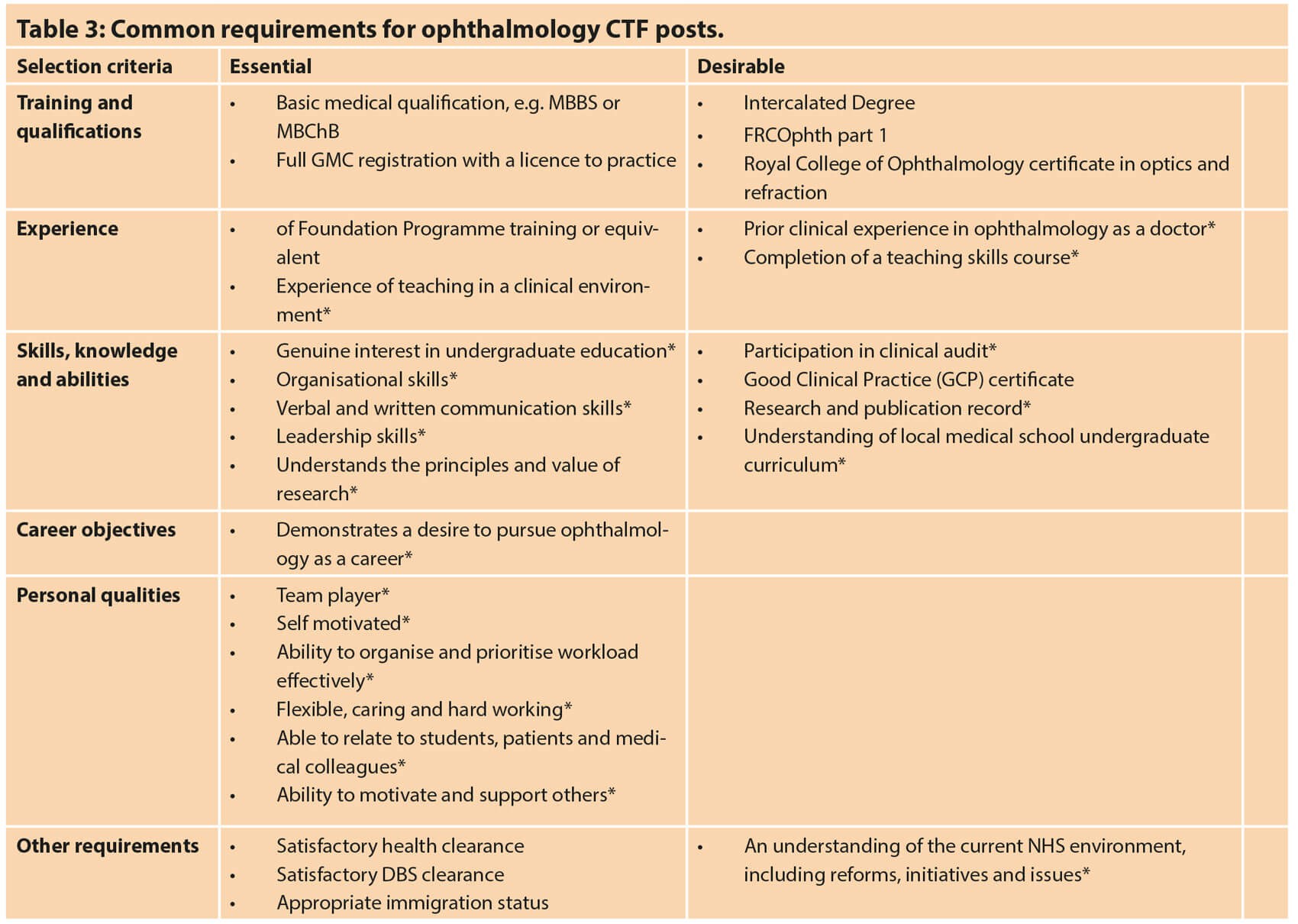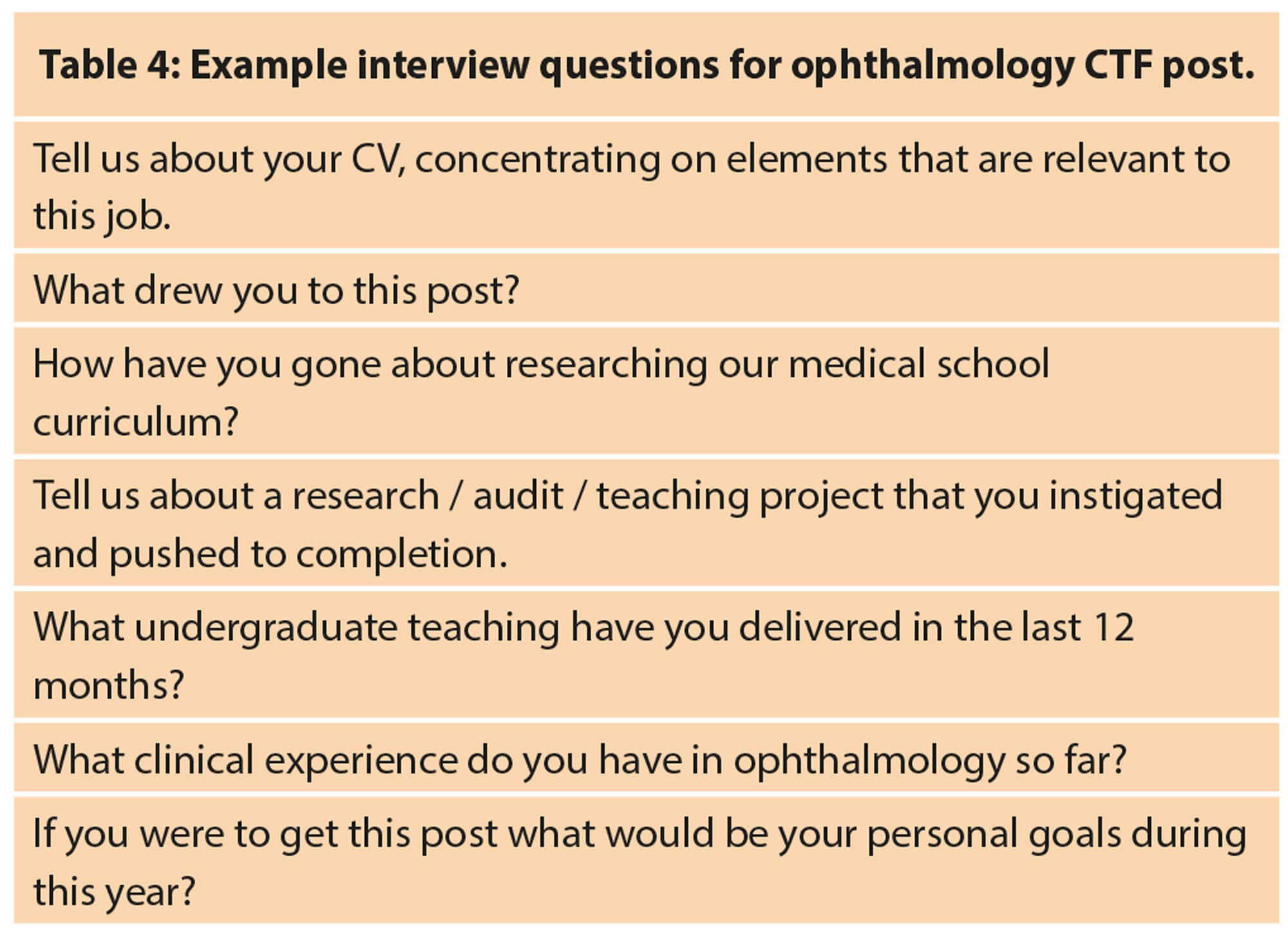
Ophthalmology is known for being one of the most competitive medical specialties in the UK, with 6.8 applicants per post in 2021. In fact, the competition ratio has drastically increased in recent years, rising from 5.73 in 2020 and 3.24 the year prior [1].
The competitive nature of the field requires applicants to be well rounded and demonstrate aptitude across a number of well-defined domains in their portfolio: education; training and experience; audit, research and teaching (Table 1) [2].

* Points exclusively available at undergraduate level. Sections in bold show points which can be acquired from working as an ophthalmology clinical teaching and / or research fellow.
Much of this portfolio building should begin as early as possible during medical training, with several points being exclusively available at the undergraduate level. This can be challenging due to the highly specialist nature of the field and the limited exposure medical students and junior doctors get to the specialty during their training. Furthermore, individuals who decide to pursue ophthalmology after graduating medical school may be disadvantaged owing to missed points, which can only be obtained during medical school, and the limited time available during foundation training to obtain sufficient experience for the application.
In recent years, there has been a rise in popularity of clinical teaching (and research) fellow (CTF) posts throughout the UK [3]. Such posts are aimed at junior doctors who are either between training jobs or have taken time out of a formal training programme [3]. Not only do these posts provide a valuable asset for undergraduate medical departments, they offer doctors a wealth of opportunities, such as medical education, leadership, innovation, research and clinical experience within a specialty of interest [5]. These all help to make the CTF more well rounded and can enhance their portfolio in preparation for specialty applications. Using one ophthalmology CTF post as an example, this article will explore the benefits of undertaking such a post in order to improve the chances of securing an ophthalmology training number.
Junior clinical teaching and research fellow in ophthalmology
The post titled ‘junior clinical teaching and research fellow in ophthalmology’ is based at the Royal Free Hospital and is one of several ophthalmology CTF jobs available throughout the UK. It is ideally suited for trainees post-Fy2 who wish to enter ophthalmology specialty training (OST) and want to gain experience in teaching and research to build their portfolio [6]. As the current post-holder, I feel ideally placed to provide an overview of what the job entails and how it can be of benefit to the OST application.
As with many CTF posts, this job provides a mix of teaching, research and clinical experience. Post-holders will spend the majority of their time organising and delivering a teaching programme for University College London medical students as part of their one-week placements in ophthalmology. Such teaching includes the fundamentals of ophthalmic history taking, clinical examination skills and common presentations such as the red eye and visual loss. This ophthalmology teaching also pertains to elective medical students, nurses, orthoptists and foundation doctors. In terms of research, the CTF actively contributes to research activities within the local department. Principally this involves working with the phase 3 trials team and coordinating imaging for the research, such as optical coherence tomography and colour fundus imaging. Finally, the CTF gains ample ophthalmology experience through regular attendance in clinics and theatre sessions, where they are able to see patients under supervision and acquire some of the skills necessary for a specialist ophthalmic consultation. This experience is supplemented by weekly departmental teaching for local ophthalmic trainees and staff, including the CTF. The post is for a period of 12 months and is un-banded Monday-to-Friday 0900-to-1700 hours, with no out-of-hours commitments. A typical weekly timetable is illustrated in Table 2.

Benefits of the job
Not only does such a post provide ample opportunity to maximise points for the OST application, but the wealth of ophthalmic knowledge and experience gained by the CTF helps to form the foundation of their ophthalmology career. Such experience gives the post-holder a unique advantage upon entering OST as they have already begun to acquire the basic knowledge and skills necessary for ophthalmic clinical practice, such as slit lamp examination and specialist investigations. The very act of teaching fundamental ophthalmic concepts to medical students helps to consolidate the CTF’s knowledge base. Moreover, the lack of out-of-hours commitments provides greater time for personal and professional development.Based on the 2022 OST national recruitment scoring system, the CTF post potentially offers 40 out of 50 points towards the application portfolio (see Table 1).
Whilst many of these points can be obtained during medical school and foundation training, the ophthalmology CTF position is advantageous because it can give the post-holder ample exposure to an ophthalmology department. The CTF has opportunities to write about interesting or rare case reports seen in the department, publish and present local study data at regional, national and international meetings, and lead local quality improvement projects. All of these can potentially yield prizes and awards, thereby contributing more points to the portfolio.
The ophthalmic knowledge and skills gained from the post facilitate preparation for exams such as the FRCOphth part 1 and refraction certificate. Furthermore, the teaching component of the job enables post-holders to undertake a formal role in examining undergraduates and developing new educational resources, both of which contribute further points to the application. Although not integrated into the Royal Free Hospital post, some CTF positions may also offer opportunities for higher teaching qualifications and completing a teaching the teachers course (or equivalent). Finally, working within a busy ophthalmic department offers ample opportunity for gaining multi-source feedback, another important domain which can highlight well-rounded trainees.
Challenges of an ophthalmology CTF post
Despite having numerous benefits, there are always challenges to being a CTF, as with any job. In the case of ophthalmology CTFs, there may be an initial steep learning curve as the CTF familiarises themselves with the local undergraduate curriculum and specialist ophthalmic and research concepts necessary for the role. Furthermore, whilst the Royal Free Hospital post is clearly structured, other posts may be relatively less so and this can be overwhelming for some [7]. As a result, there is a need for CTFs to be proactive and organised when planning their year. Fortunately, there are a growing number of resources available to new CTFs which provide advice on how to make the most of their time in the post [8].
Tips for finding CTF posts in the UK
Although there are a number of ophthalmology CTF posts advertised yearly, many are advertised towards the beginning of the year so that the start dates coincide with the end of the junior doctor training jobs and the start of the undergraduate academic year. Such posts may be advertised locally or online through websites like BMJ careers and NHS jobs [3]. It is advisable to set up an ‘email alert’ using your desired search criteria which will provide regular updates on newly advertised jobs. A simple Google search for ‘ophthalmology clinical teaching / research fellow’ may also identify positions newly advertised across the country. Another option is to approach the local ophthalmology department or medical school(s) to enquire about potential job opportunities locally.

*May be assessed at interview
What to expect on the CV
Due to the competitive nature of ophthalmology, it is no surprise that ophthalmology CTF posts are highly sought after. CTF job advertisements are usually explicit regarding the required ‘person specifications’ and may vary depending on how much teaching or research the role demands. Table 3 highlights some of the common ‘essential’ and ‘desirable’ requirements which candidates may be expected to demonstrate through the CV and interview [6,9,10]. It is important, however, for candidates to fully familiarise themselves with the specific requirements for each post they apply to.
What to expect at interview
The interview process for many of these posts is typically panel-based and conducted either face-to-face or remotely online. Interviewers may be ophthalmologists, medical school staff, members of the human resources team or researchers. Whilst a major goal of the interview is to identify whether candidates meet the essential and desirable selection criteria for the job, is it an important opportunity for candidates to find out more about the nature of the job role and working environment. Candidates should ensure the position allows them to achieve their goals for time out of training, for example, opportunities to obtain higher teaching qualifications and publish research [11].
The exact format of the interview may vary depending on the institution and CTF job description, however, interviewers will typically ask questions regarding the candidate’s teaching, research and clinical ophthalmology experience throughout their undergraduate and postgraduate training. Example questions are provided in Table 4.

In general, interviewers are keen to find out why a candidate is interested in their institution and that particular job role. A useful tip is to speak with previous post-holders regarding their experiences [11]. Not only does this give realistic insights into the benefits and challenges of the job, but it demonstrates initiative and proactivity to the interviewers. Finally, it is not uncommon to be asked about potential real-world scenarios in the interview, such as a busy, overbooked ophthalmology clinic in which medical students are shadowing and expecting teaching. Such scenarios test the candidate’s ability to think on their feet and apply problem-solving skills to common scenarios they will encounter during the job. It therefore helps to anticipate and prepare for such questions.
Conclusion
Despite some of the challenges an ophthalmology CTF job presents, the benefits to the post-holder are clear. As well as providing opportunities for teaching and research, working as a CTF gives junior doctors time and support to improve their chances of securing an ophthalmology training number and develop themselves as future ophthalmologists.
References
1. Health Education England. Competition Ratios 2021:
https://specialtytraining.hee.nhs.uk/
Competition-Ratios
2. Health Education England. Severn Postgraduate Medical Education - Recruitment 2021:
https://severndeanery.nhs.uk/
recruitment
3. Furmedge D, Verma A, Iwata K, et al. The rise of clinical teaching fellowships. BMJ Careers. 2013;347.
4. Marriott C, Boyd J. Clinical teaching fellows: a mutually beneficial relationship. Trends in Urology & Men's Health. 2020;11:30-1.
5. Pippard B, Anyiam O. The many roles of a clinical teaching fellow. BMJ 2016;355:i5677.
6. NHS Jobs. Junior Clinical Teaching & Research Fellow - Ophthalmology (Med Retina) 2021:
https://www.jobs.nhs.uk/xi/
vacancy/916538426
7. Wilson S, Denison AR, McKenzie H. A survey of clinical teaching fellowships in UK medical schools. Med Educ 2008;42(2):170-5.
8. Roberts D, Morris G, Crees A, et al. Top tips for a teaching fellowship. Clin Teach 2014;11(7):520-3.
9. NHS Jobs. Clinical Teaching Fellow - Ophthalmology 2021:
https://www.jobs.nhs.uk/xi/
vacancy/916568179
10. NHS Jobs. Clinical Teaching Fellow in Ophthalmology 2021:
https://beta.jobs.nhs.uk/candidate/
jobadvert/C9164-21-4556
11. Rimmer A. How do I select the right clinical teaching fellowship? BMJ 2019;364:l635.
(All links last accessed December 2021)
Declaration of competing interests: None declared.
COMMENTS ARE WELCOME









